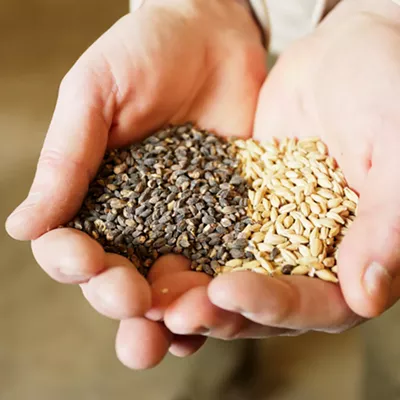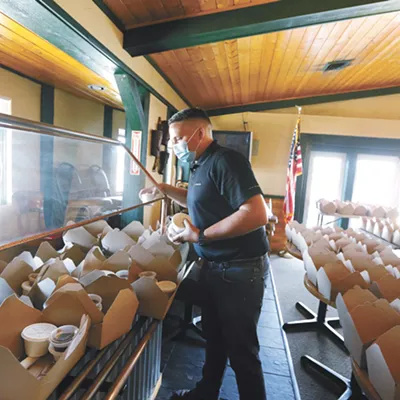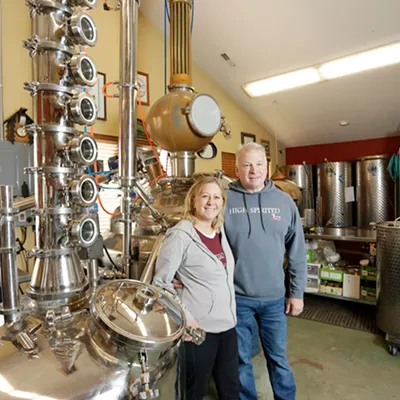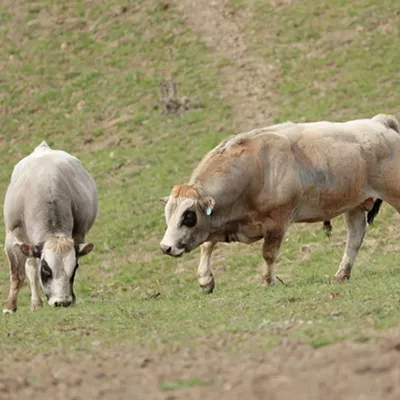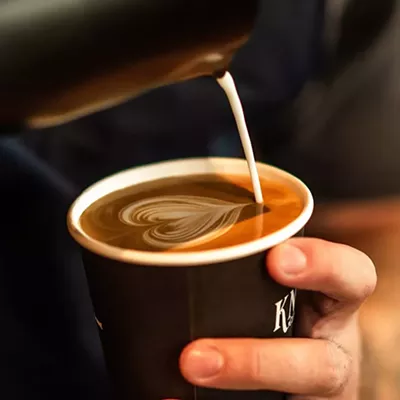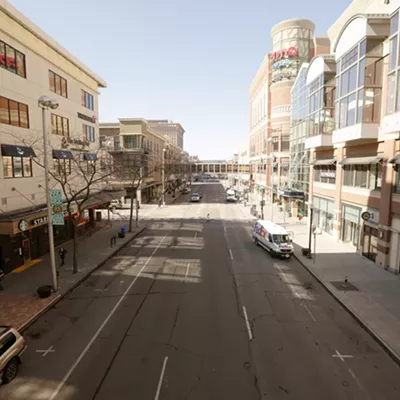For Francisco Gutierrez, good tequila is personal.
His family traces its roots to Jalisco, the state of Mexico where tequila has to be made — just like Champagne has to be made in Champagne, France.
"I've always been around tequila," Gutierrez says. "It's always been in our family. I mean, that's our blood."
Gutierrez is the financial adviser for Nuestras Raíces Centro Comunitario, which translates to "Our Roots Community Center." He's also the founder of Tacos y Tequila, an annual festival in downtown Spokane that supports the center, celebrates Hispanic culture, and honors local residents' Mexican and Latin American roots.
Tacos y Tequila started as an outdoor way to supplement Nuestras Raíces' largest fundraiser, Viva Vino & Brew, when the center couldn't host the gala in person due to COVID restrictions in 2021. But now, Tacos y Tequila is a staple event. For the last weekend of August, street tacos and craft booths take over Spokane Falls Boulevard in front of the Central Library for a much anticipated two-day fiesta.
Proceeds benefit the center's work providing scholarships and economic development support, plus a food and clothing bank and a free youth soccer program for the Spanish-speaking community in the Inland Northwest.
This is only the festival's fourth iteration, but so far it's nearly doubled in size every year, according to Nuestras Raíces' public relations and marketing coordinator, Brianda Perez. In 2021, the festival had under 2,000 attendees. Last year, it had over 6,000. Nuestras Raíces is expecting even more people this year — not just from Washington, but from Oregon, Idaho and California as well.
In addition to food and drink, there will be plenty of live music. The festival features local acts, like Nuestras Raíces's own ballet folklórico (folk dance) group. There are also musicians coming from surrounding states. A stage overlooking the Spokane Falls will showcase everything from traditional Norteño and mariachi bands to a drag show and tributes to Carlos Santana and Selena.
"I think we can offer the idea that Spokane is not really what most people think," Gutierrez says. "There's this cultural event that's growing. It's a great way for everyone to get together and for us to share [with] the greater community."
If there's anything more Mexican than tequila, it's tacos.
"You think of Mexican food, you think tacos," Gutierrez says. "They're synonymous."
Perez has also done her research about tacos. Their origin is definitely pre-Hispanic colonization, she says. It's thought that the famous Aztec emperor Moctezuma II used tortillas as spoons and that Aztec women used tortillas to wrap the lunches of field laborers.
According to her research, the name "taco" is probably a bastardization of an Indigenous Nahuatl word, either "tlahco" which means "in the middle," or "quauhtaqualli," a word for tortilla that was complicated for the Spaniards to pronounce.
But today, Gutierrez's favorite thing about a taco is how simple a perfect one can be.
"A corn tortilla and just a meat in there," he says. "It could be beef, pork, chicken. Oh, and a good salsa. I mean, that's as simple as it gets."
Onions and cilantro complete the experience for Gutierrez. And it probably should be noted that getting carne asada, al pastor or chicken tinga just right is no small feat — it usually takes hours of prep and generations of know-how.
But the festival has expanded this year to include even more than tacos. Cuisines from other Latin American countries are represented, like Salvadoran pupusas from Sabor Latino and Colombian arepas from Ricura Caribeña Catering.
And, obviously, there will be some really good tequila: nine spirits in total from five different brands. The focus is on more artisan distilleries, including La Gritona Reposado, a female-led distillery in Valle de Guadalupe, a small town about 60 miles northeast of Guadalajara, the capital of Mexico's Jalisco state.
Gutierrez is partial to a good reposado, which La Gritona specializes in. Tequilas come in three ages — blanco, which is unaged; reposado, aged between two months and a year; and anejo, aged anywhere from one to three years.
No matter what, a good tequila is going to be 100% agave. Any added sugar cheapens the spirit and contributes to a nasty hangover the next day. Gutierrez says he's spent plenty of nights drinking good tequila and woken up feeling fine the next day.
"What I wanted to show with this event was to share some culture — almost reclaiming it, saying, 'Hey, tequila is a Mexican thing. It's a Jalisco thing,'" Gutierrez says. "Then educating people along the way that this is a good tequila. There's always going to be some cheap tequilas out there, right? So [we want] to showcase the good stuff."
The lobby of Nuestras Raíces Centro Comunitario has handmade art on the wall and a jersey from the center's free youth soccer program. The community center is an outgrowth of the Hispanic Business Professional Association, a networking and scholarship organization that's been in the Inland Northwest for over 25 years.
It moved to this center last year after outgrowing a small office space. Now there's a conference room, a dedicated space for collecting and distributing culturally appropriate food and clothing, and community space for workshops and dance rehearsals.
On a large back wall of the shared space, a huge monarch butterfly spreads its wings against a bright blue background. Above the mural are painted the words "La migración es beautiful," or "Migration is beautiful."
"I think the butterfly represents us as Mexican or Latinos, because we immigrate from our home country to a different state or country," Perez says.
Monarch butterflies winter in Michoacán, a Mexican state between Mexico City and the Pacific Ocean. It's the same state that Perez is from. For her, the butterfly is a special reminder that finding a new home doesn't have to mean giving up a different one.
The Hispanic community in Spokane County has grown from around 3% in 2010 to over 7%, according to 2022 data. Nuestras Raíces leaders are already wondering if they'll need a bigger space in Spokane. They just opened an office in Othello to become a hub for more of Eastern Washington. Tacos y Tequila is an opportunity not to just share food and culture with the entire community, but also knowledge and support for local Latinos.
"We hope that they learn about our center and all the resources we have," Perez says. "I want them to take back that feeling of welcome in the community, especially in Spokane ... to remember all those memories when they were back in their home country."
"I want people to know that we are here, that we're here to help you," Gutierrez says. "Then lastly — make friends in the streets. It's so fun when everyone's just dancing in the middle of the street."
But what if you're not a good dancer?
"Tequila fixes that," he says.
Now that's a good tequila. ♦
Tacos y Tequila • Sat, Aug 24 and Sun, Aug 25 from 1-10 pm • Free admission • All ages Central Library • 906 W. Main Ave. • tacosytequilawa.org • 509-557-0566










